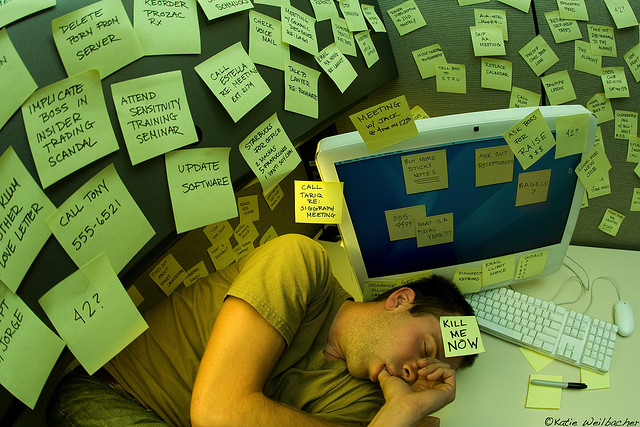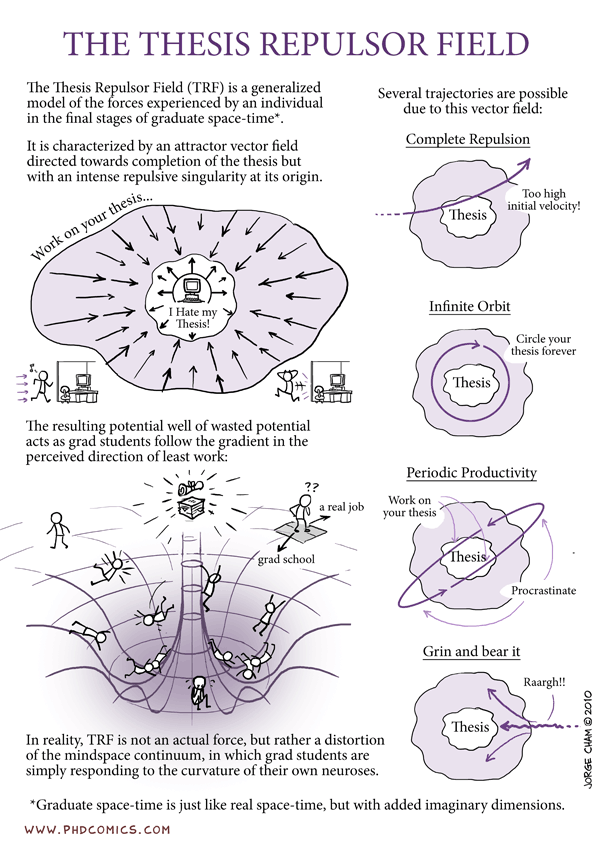
Image via Katie Weilbacher
It is a truth universally acknowledged that graduate school will take over your life, if you let it.
The trick is not to let it, but if that were easy the biggest drug expense for student insurance would not be anti-depressants (I have it on good authority that this is the case at the university I attend).
The problem is that university effectively rewards workaholism – or what my roommate in undergrad and I termed “The Guilt”. This is when you come home exhausted but there’s still more to do so you spend your evening either working, or feeling so guilty about not working that you don’t enjoy it. It’s what causes you skip yoga or that class at the gym you wanted to go to because you’re “making progress” and why you eat takeout because you can keep working until it’s delivered and you’re so mentally exhausted that you haven’t got round to buying groceries this week and it’s Friday already anyway.
This is a miserable way to live. In undergrad however, you at least have respite during the summer and (if you’re lucky) in winter break. Graduate school runs all year round, however, so after living with The Guilt 24/7/365 for a number of years it is easy to feel like you’re losing your mind.
Between third and fourth year of my undergrad, I interned at a company. It was amazing, I was productive, I was happy, and I was in amazing shape physically because I got in at 0830, left the office by 1800 and went to the gym. That was what made me realize that The Guilt – the constant working and the neglect of every other area of your life doesn’t actually result in achieving more (assuming you don’t measure your life in small blue pills and trips to the therapist). It just results in misery.

Image via NTBrown for BARC
I wish I could tell you that as a result I dramatically changed how I worked and have ever since led a happy and well balanced life – but that would be a load of crap! The thing about a regular job is that it has boundaries – a computer that you don’t necessarily take home with you, an office that you go to, a time after which your boss doesn’t expect to get hold of you. The appeal of grad school is the flexibility – work when you want! Where you want! And that can come to mean “work everywhere, all the time” – but it shouldn’t. I did make some changes, though. I spent more time with friends. I stopped staring at hard problems and instead went swimming to clear my head. I tried to hang onto the habit of getting up at a reasonable time. Flirted with the idea of not working every evening. This helped, but The Guilt kept lurking.
After a year off, mostly spent jittering about the world skiing and kickboxing, the memory of The Guilt had faded sufficiently that I went on to grad school – in city where I knew no-one, on another continent. There’s a long story behind this, starting when I moved with about a weeks notice, but here’s the summary: I ended up living with a 30-year-old Catholic philosophy student who after 2 months went bonkers and the two girls I’d become friendly with both left the city (for different reasons). Feeling a little friendless and alone I ended up spending a lot of time with a recently dumped passive aggressive with borderline personality disorder.
Chaos ensued. But – I was still doing pretty well at school. And eventually I hit a wall, decided I wasn’t going to be controlled anymore and refused to talk to the passive aggressive, ignoring the arguments of my then-boyfriend and Pet Hobo (guy who’d been living with us rent-free for four months – another story). Drama and backstabbing ensued as Pet Hobo decided his loyalties lay with the woman he wanted to sleep with (the Passive Aggressive) and not me.

Image via Rude Cactus
But eventually the dust settled, and there it was – my cognitive surplus.
Now, I would never suggest that you fill your life with lunatics in order to locate your cognitive surplus. In fact, I would advise very strongly against it. For starters, they are very, very hard to get rid of. But the biggest reason is that lunatics are not a good thing to spend your cognitive surplus on.
So, having found my cognitive surplus I started using it for things that weren’t grad school. I realized that I wasn’t learning what I needed to at university and started reading voraciously around and outside my subject (computer science). I resuscitated the Women in Science and Engineering group at my university and met some lovely people as a result. I started blogging. I took a summer contract in Shanghai, and after the break came back refreshed and motivated to work twice as hard. I was asked to TA in French, and I did – surprised myself by not sucking at it, and I submitted a proposal for a talk entitled “Art, Life and Programming”, which I ended up doing (in English and in French), and as a result got asked to develop a workshop, which was awesome. Things started to spiral and sometimes it was stressful, but I was still moving forward with my graduate work, and even spending a day a week working as a ski instructor during the season. Then I got offered a place in IBM’s Extreme Blue internship (my work with WISE got me noticed by the recruiter) and took the summer off to do that. Once again, I had structure in my life – I worked long hours, but I was loving what I did, and had time to launch Awesome Ottawa, study for interviews at Google, and plan with another EB intern the CompSci Woman blog (launched September 1st).
By the end of the summer, my time away from my research has led me to rethink my direction and I’m really, really excited to go back to it. I have an amazing job lined up for January, which will motivate me to finish on time (this will be my 5th semester if you don’t count the one in Shanghai).
The thing is, I don’t think I would have this job lined up, and I would definitely not have spent the summer at IBM if I hadn’t found my cognitive surplus. I might have finished earlier, but probably not because my interest in blogging and twitter has definitely influenced the direction of my research (and made it better). In fact at the moment, I’m working on a side-project with a friend in the Communications department to visualize her research (I’m also working on Twitter so I gave a talk to the Communications grad students and that’s how we connected).
Your cognitive surplus is there – it’s just being eaten by The Guilt and/or unnecessary drama.
So, I hope I’ve convinced you that you want to find your cognitive surplus but as this post is entitled “How to find your cognitive surplus in graduate school” here are some tips and tricks that I find helpful.
Avoid a reactionary workflow
I really think this is the number one thing that enables me to do everything that I do. Email is a huge killer of this (why I hate email), so I check it infrequently and don’t have alerts set up. Twitter can do this too, so whilst I use Twitter during the day I don’t click any links but instead mark things as favourite and go through them at times when I won’t be productive. I schedule links that I want to share through the week (using SocialOomph) and also schedule my blog posts. When scheduling things in my calendar, I know what works for me in terms of effectiveness (enough going on that I don’t spend too many days in my pjs, and enough free that I can have long chunks of time to focus) and I try and work to that. Also, I don’t play the “I’m busier than you” game – it’s stupid and pointless. I try to say yes to opportunities, but I’m learning how to say no to things that aren’t.
Don’t give up what you love theorizing that it’ll still be there when grad school is done – say yes to things you are passionate about
During last winter, I worked one day a week as a ski instructor. Some people thought this was bonkers, but spending a day a week on the hill away from my computer (and cell phone service) was really refreshing, and I’d go back to my thesis more motivated. That might be the only time that I end up teaching skiing, and I’m glad I did it.
The Awesome Foundation is a group of 10 trustees and a dean and every month we give away an $1000 grant (each trustee puts in $100). The sensible thing to do would be to wait until I have a regular job to do something like this, but I had a well paying internship and I decided to do it now, not later. The fall will be harder as a result, and yes, it takes time, but I cannot tell you what I buzz I get from helping enable stuff like this. It keeps me going.
Eliminate people who don’t support you, or create pointless drama
This should be self-explanatory after my story about the passive aggressive above. Don’t underestimate how much some people drain your energy – why are you letting them?
Surround yourself with people who support and believe in you
I got a ton of stuff done this summer. What changed? My social circle. I started spending more time with amazing people who believe in me and who pushed me forward even when I doubted myself.
Make commitments – and keep them
Leadership and Self Deception (Amazon) is an amazing book, and it talks about how “betraying yourself” (thinking one thing and then doing another) is damaging to your relationships – this applies in work and in other areas of your life. Don’t break your commitments – in my opinion it has the same effect. And don’t weasel around this one by not committing in the first place, “I’ll do X if I get enough work done” is usually a guarantee that you won’t do X. Work with the constraint – often, you’ll surprise yourself.
Commitments doesn’t just apply to spending time with friends, but also non-grad-school things that you do. After work and life settled down earlier this summer I committed to 3 blog posts a week. Sometimes I schedule them in advance, sometimes I think “damn I don’t have anything scheduled for tomorrow”. But I’ve kept that commitment, and it’s helpful. Self-discipline is self-perpetuating – self-discipline in one area of your life will flow to other areas. I keep over-committing myself, but it does tend to work out.
Sleep
I genuinely don’t know how anyone expects to be effective whilst not getting enough sleep. If sleep deprivation can affect your moral judgement, what else will it affect? Make time for the 7-9 hours you need a night, every night. You’ll feel better, and be more effective for it. You are not Jon Skeet, who does, shockingly, actually sleep ~6 hours a night.
Exercise – use a gym buddy or trainer to help stick to it
IMO, you can cope with one, maybe 2 nights of insufficient sleep at a crunch. I think you can take a week off exercising in a crisis. However it’s not a long term strategy – being unhealthy is a huge time sink. Last fall I dislocated my kneecap and couldn’t do anything – for a while, I could barely walk. It took me a while to get back into reasonable shape (and I’m still not where I want to be) but the difference is enormous. Go back to the gym with a friend to motivate you, make a schedule and stick to it. You’ll feel better for it – promise.

Image via PhD comics
Set goals
Your thesis is this huge, and often far off goal – it’s hard to comprehend achieving it and all you can really do it chip away at it. Goals are important, and not something like “make progress on thesis” – they need to be tangible, like “read 5 papers” and “review chapter 2 and send to supervisor”. I spend a lot of time thinking about effectiveness and time management, and I’ve found a system that works for me. I separate my top level (yearly) goals, from my mid-level (weekly) goals, and my Remember The Milk todo list. This keeps me sane – my todo list should mean I work towards my mid-level goals, and my mid-level goals have to be such that they work towards my overall plan. I put my top- and mid-level goals in public on my blog. This is just what works for me, try it or find some other system that works for you – but set goals – how else do you know if you’re on track?
Find an imbalance you can live with
I don’t know any grad student who has a balanced life. I certainly don’t. But I realized that the problem wasn’t the imbalance, it was the nature of it. Now I work to have an imbalance that I can work with – I even experimented with a PA this summer and I delegate as aggressively as I can. For CompSci Woman, my friend and I have an agreement that I deal with WordPress and she deals with email – it works to our strengths. We also decided that neither of us have the time or inclination to manage a Twitter account so we just automate that from the blog. Hopefully in time we’ll be able to delegate it. We accept that for a side project we can’t do everything, and we need to do mostly things that we enjoy.
Forgive yourself for failing
I have achieved my weekly goals a total of ONCE. So pretty much every week my eyes are bigger than my achievements and I fail. At the start of the summer, I had two – huge failures – I’ve since bounced back. I actually finished work this summer with 32 unread emails (I hope they weren’t important). What was important was that I got our two patent disclosures in, and beating myself up about never getting to those emails would be unproductive. You’re going to fail – and when you do, decide what you can learn and move on from it.
~~~~~
In a similar vein – How To Be Crazy Busy Without Losing Your Mind
Cate Huston is an alumna of IBM’s Extreme Blue program and will finish her Masters in Computer Science at the University of Ottawa researching influence and media contagion on Twitter by the end of 2010. She has a BSc (hons) in Computer Science from the University of Edinburgh. Cate has trained in martial arts in China and is a CSIA Level 2 certified ski instructor. She has taught programming in the UK, US, China and Canada and has developed programming curricula that was taught across the US. You can find her latest CC-licensed curriculum, developed for uOttawa here. Cate is the former president of Women in Science and Engineering at uOttawa and is currently Instigator of Awesome at Awesome Ottawa and an Editor of CompSci Woman. She blogs about technology, programming, effectiveness and life at Accidentally in Code and twitters as @catehstn.





